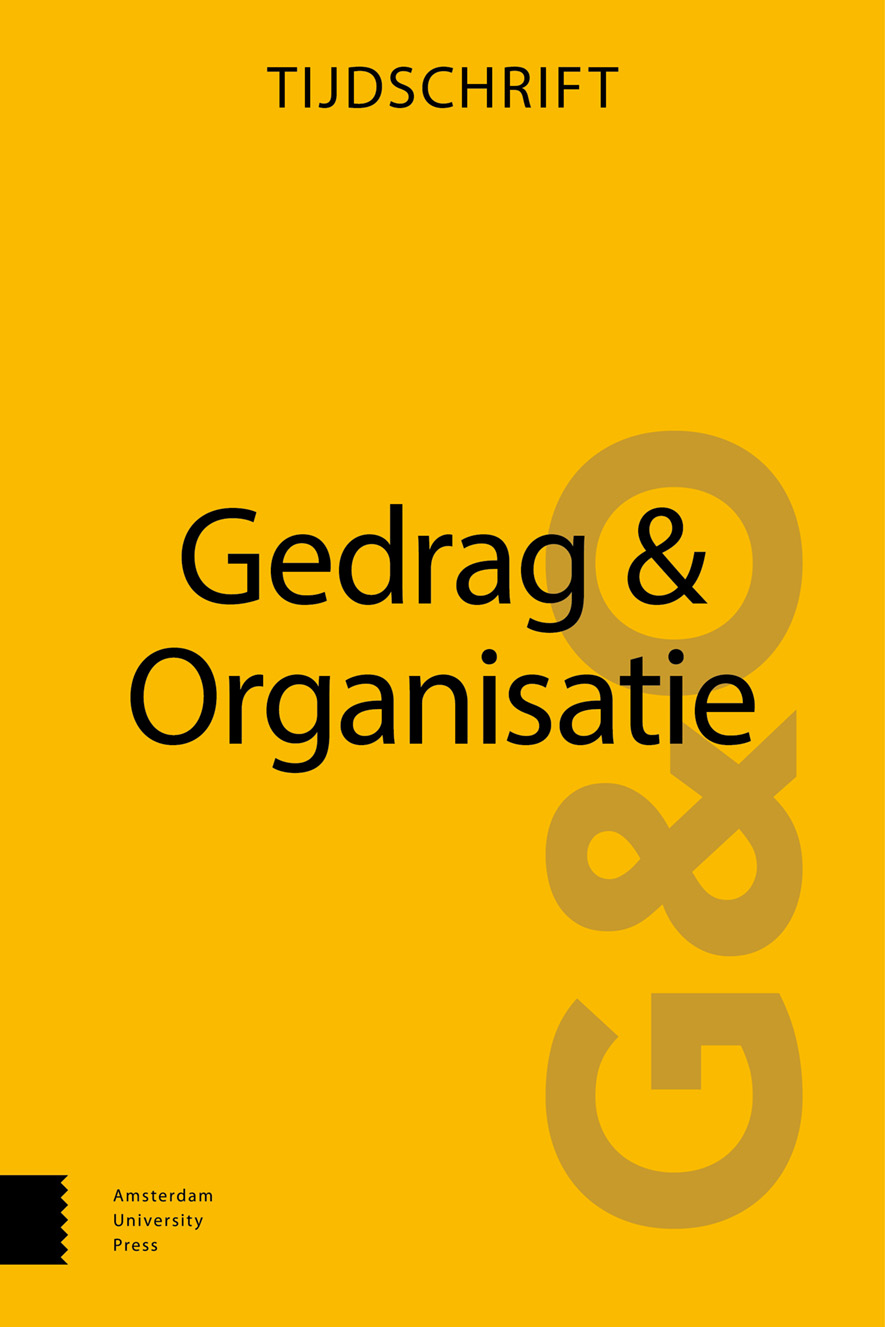- Home
- A-Z Publications
- Gedrag & Organisatie
- Previous Issues
- Volume 22, Issue 2, 2009
Gedrag & Organisatie - Volume 22, Issue 2, 2009
Volume 22, Issue 2, 2009
-
-
Pesten op het werk: de relatie met gezondheid en verzuim en de rol van coping
More LessAuthors: Francine Dehue, Catherine Bolman, Trijntje Völlink & Mieneke PouwelseBullying at work: the relation with health en absenteeism and the role of copingBullying at work: the relation with health en absenteeism and the role of coping
F. Dehue, C. Bolman, T. Völlink & M. Pouwelse, Gedrag & Organisatie, volume 20, June 2009, nr. 2, pp. 97-117
In this study, the influence of coping on the relation between bullying experiences at work and health complaints and absenteeism has been investigated. One thousand randomly chosen employees received a questionnaire which was completed and returned by 361 employees. Results revealed that 139 employees (39%) were bullied at least once a month and 64 employees (18%) at least once a week on at least one of the bullying experiences listed in the questionnaire. Employees who have been bullied weekly, report more health complaints and were absent during more days than employees who have been bullied monthly or who have not been bullied at all. They are also more often inclined to compensate as a means of coping with problematic situations. Compensating and a positive active attitude towards problematic situations are coping strategies which moderate the relation between bullying experiences and health complaints and absenteeism. However, using these coping strategies as a response to bullying experiences is detrimental to one's health and supports absenteeism, just as negative organizational and leadership aspects, which are also associated with bullying experiences.
-
-
-
Van preventie naar amplitie: interventies voor optimaal functioneren
More LessAuthors: Else Ouweneel, Wilmar Schaufeli & Pascale Le BlancFrom prevention to amplition: interventions for functioning optimallyFrom prevention to amplition: interventions for functioning optimally
E. Ouweneel, W. Schaufeli & P. Le Blanc, Gedrag & Organisatie, volume 22, June 2009, nr. 2, pp. 118-135
The recent rise of positive organisational psychology has laid out the theoretical foundation for research into positive work-related well-being. Now the time has come to translate this theoretical knowledge into practical positive work-related interventions. To that end, we introduce the term amplition in this article, after the Latin word amplio, meaning to enlarge, increase, or magnify. Interventions focused on amplition aim to enhance positive work-related well-being. This kind of interventions have hardly been designed, let alone tested among employees. The main objective of this paper is to demonstrate that the essential ingredients for these interventions are basically at hand. It is suggested to use the existing empirical knowledge on happiness interventions and on validated implementation techniques to compose work-related interventions focused on amplition. We conclude that work-related interventions should not focus exclusively on employees who are stressed or burned-out, but also on employees who are functioning well, but not yet optimally.
-
-
-
Socio-cognitieve conflictregulatie: constructie en validatie van een Nederlandstalige vragenlijst
More LessAuthor: P. Marijn PoortvlietSocio-cognitive conflict regulation: construction and validation of a Dutch instrumentSocio-cognitive conflict regulation: construction and validation of a Dutch instrument
P.M. Poortvliet, Gedrag & Organisatie, volume 22, June 2009, nr. 2, pp. 136-145
When two individuals have a difference of opinion, they can deal with this in various ways. This process has been called 'socio-cognitive conflict regulation'. In this research, the construction and validation of a Dutch instrument that aims to measure socio-cognitive conflict regulation is presented. The results showed that two factors can be distinguished. The first, epistemic conflict regulation, concerns the striving of individuals to understand each other's points of view and look for ways in which they can integrate their own and the other's problem solution. The second factor, relational conflict regulation, comprises the attitude of individuals to disregard the other's perspective and wanting to show that they themselves, and not the other, are right. Implications for organisational research are discussed.
-
-
-
Carrièresucces van vaders en moeders: de rol van moederschapsideologie, werk-thuis-cultuur en werk-thuis-arrangementen
More LessCareer success of fathers and mothers: the impact of motherhood ideology, work-home culture, and work-home arrangementsCareer success of fathers and mothers: the impact of motherhood ideology, work-home culture, and work-home arrangements
M.L. van Engen, J.S.E. Dikkers, C.J. Vinkenburg and P. de Rooy, Gedrag & Organisatie, volume 22, June 2009, nr. 2, pp. 146-171
Despite the increased labor force participation of Dutch women, their career progression still lags behind that of men. Differences in career success of men and women are often attributed to their different family roles and responsibilities. In this study we examined the relationships between motherhood ideology, work-home culture, and the utilization of different flexible and care-related arrangements. Next, we look at the relationship between these factors and extrinsic (objective) and intrinsic (subjective) career success of parents. Two-hundred-and-fourteen Dutch working parents filled out a questionnaire. We found that a less traditional motherhood ideology and a supportive work-home culture have a positive relationship with parents' utilization of work-home arrangements. Mothers with a traditional motherhood ideology who used care-related arrangements are more extrinsically successful than mothers with a less traditional ideology. Intrinsic career success is higher for mothers who use flexible arrangements than for mothers who do not.
-
Volumes & issues
-
Volume 38 (2025)
-
Volume 37 (2024)
-
Volume 36 (2023)
-
Volume 35 (2022)
-
Volume 34 (2021)
-
Volume 33 (2020)
-
Volume 32 (2019)
-
Volume 31 (2018)
-
Volume 30 (2017)
-
Volume 29 (2016)
-
Volume 28 (2015)
-
Volume 27 (2014)
-
Volume 26 (2013)
-
Volume 25 (2012)
-
Volume 24 (2011)
-
Volume 23 (2010)
-
Volume 22 (2009)
-
Volume 21 (2008)
-
Volume 20 (2007)
-
Volume 19 (2006)
-
Volume 18 (2005)
-
Volume 17 (2004)
Most Read This Month


